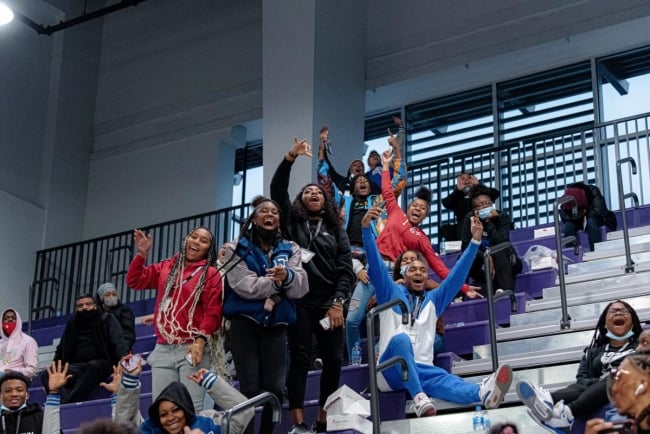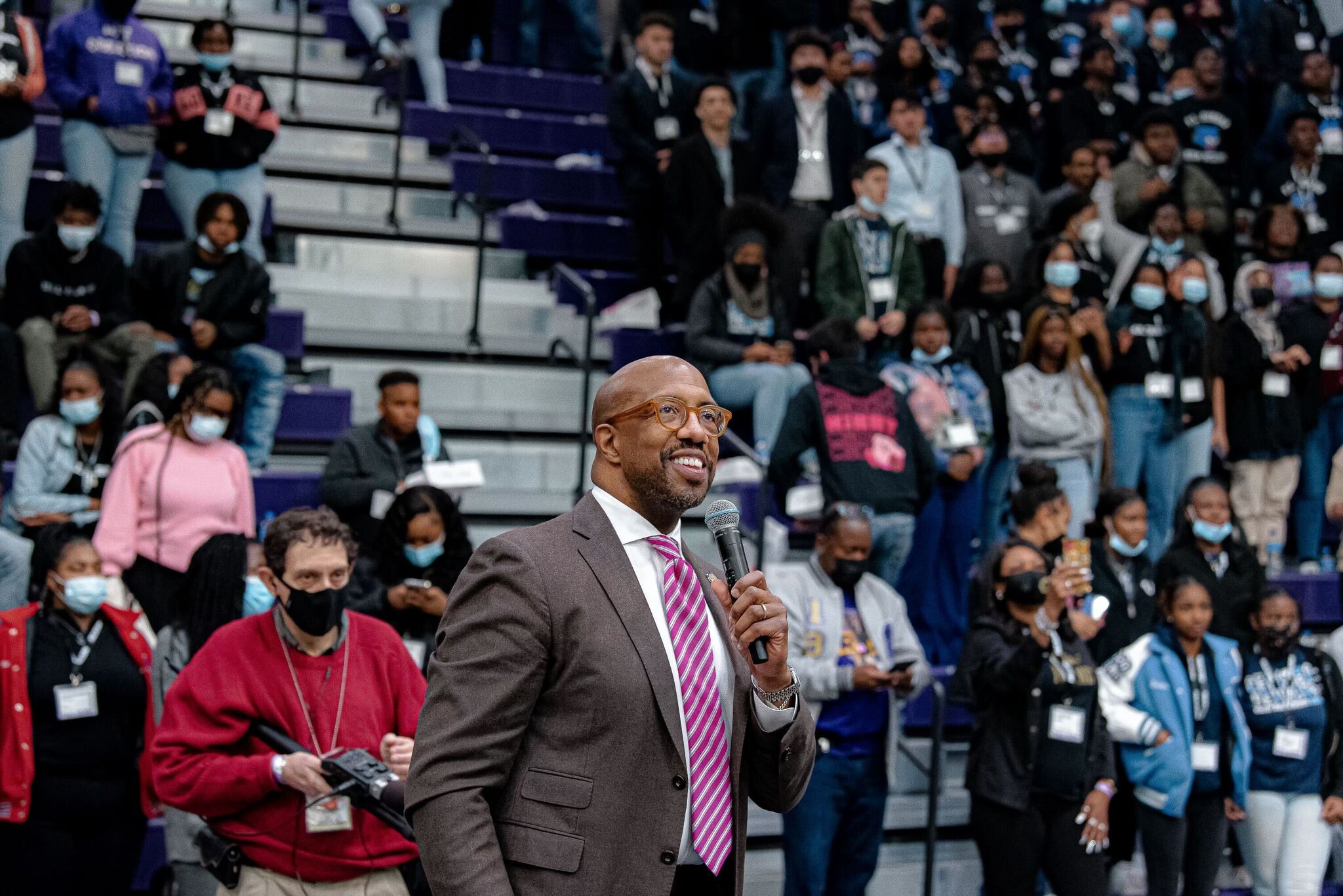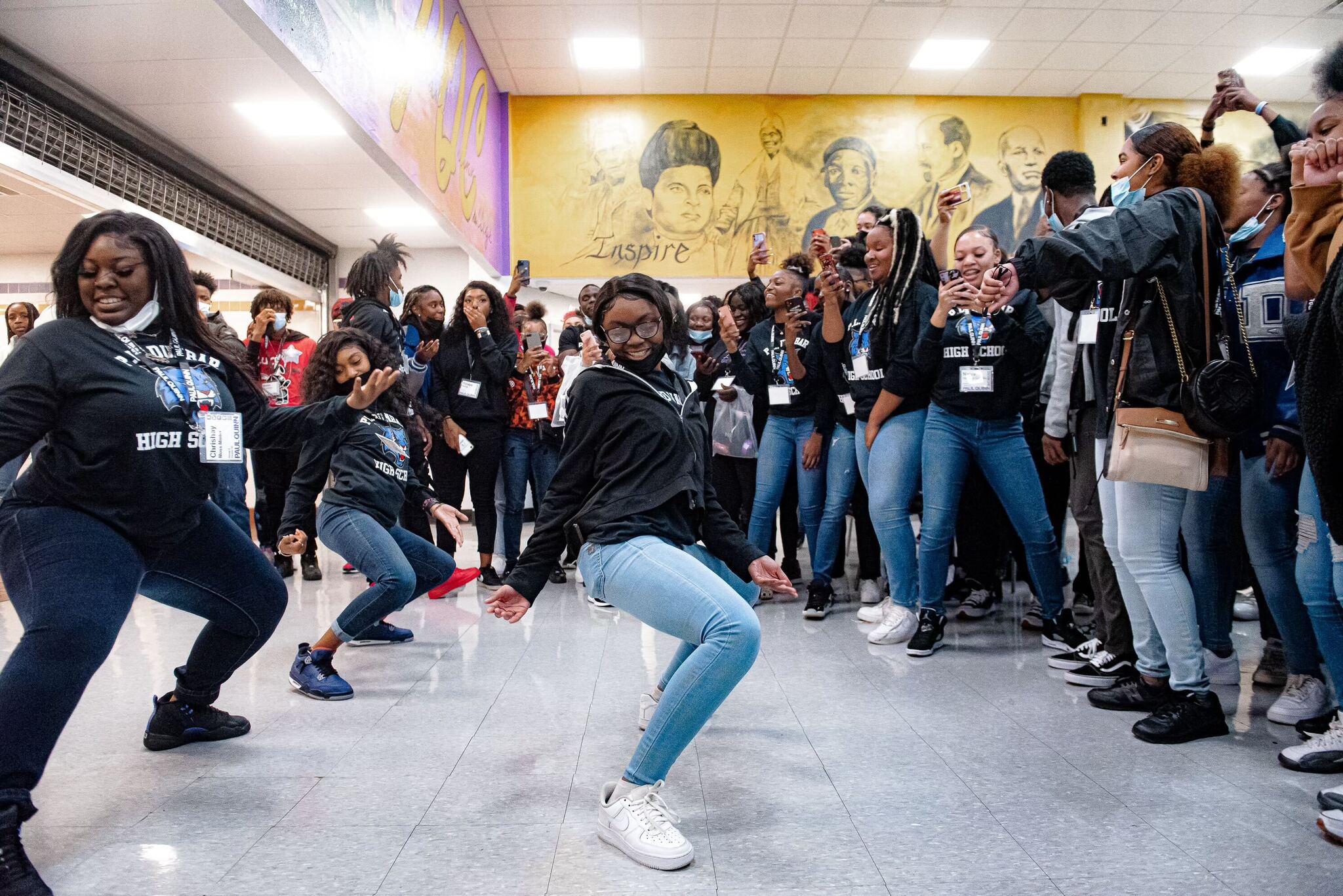You have /5 articles left.
Sign up for a free account or log in.

Roberto Hernandez
A group of high school seniors from the Fort Worth Independent School District went on what they thought was an ordinary campus tour at Paul Quinn College Thursday. They ate lunch in the cafeteria, went to mock classes and attended a basketball game on the Dallas campus.
But the tour then took a turn for the unexpected. Each of the 408 students, selected by their high school principals, left with acceptance letters to the historically Black college for fall 2022, not just for themselves but also for two of their family members.
Trenton Gardner, a senior at O. D. Wyatt High School, said he was interested in applying to HBCUs, so he was “very excited” to suddenly be accepted to one. If he chooses to attend Paul Quinn, he wants his older brother to come with him.
“They told us they had an announcement, but I didn’t think it was going to be this big,” he said.
The surprise announcement is the first phase of a new admissions approach at Paul Quinn. Starting in fall 2023, any admitted student with a 3.0 GPA or higher who is eligible for the Pell Grant—federal financial aid for low-income students—can select two family members to start college with them.
“We realized we could do something different,” said Michael Sorrell, president of Paul Quinn. “We don’t have to subscribe to the same methodologies over and over and over again.”
The goal is to create “this experience that says to all the family members, all of the students coming behind you, all of the community members, ‘College is for you. College is for all of you. And the only special thing you have to do is work hard,’” he added.
Paul Quinn leaders intentionally started this initiative by partnering with five high schools in the Fort Worth Independent School District that serve high numbers of African American students. Black students make up about a quarter of the student body in the district, said Jerry Moore, the district’s chief of schools. The district also primarily serves low-income students; 85 percent of students and their families live at or below the poverty line.
Moore described the effort as “an opportunity to really change a community.”
Paul Quinn’s student body is approximately 97 percent Black and Latinx. The majority of its students, 80 percent, are eligible for the Pell Grant. Paul Quinn is also one of nine federally funded work colleges in the country, and the first in an urban area, that requires full-time students to hold a job alongside their studies. Students can participate in job opportunities on or off campus, which gives them work experience and makes them eligible for scholarships and stipends to help finance their education.
Paul Quinn, like many colleges and universities across the country, lost students during the pandemic. Enrollment fell to 440 students in 2020, from 550 students in 2019. While Sorrell expects an enrollment increase to accompany the new admissions approach, he said increasing enrollment wasn’t a motivating factor.
“This wasn’t done to improve enrollment,” he said. “This was done to improve lives.”
Kent Paredes Scribner, superintendent of the Fort Worth Independent School District, said he was thrilled that his students would have the opportunity to attend the institution.
“Paul Quinn is showing them their dreams can be realized, and their families are also welcome to come and learn alongside them,” he said in a press release.
From Sorrell’s perspective, the philosophy behind the new admissions approach is a simple “numbers game”: sending three people in a family to college, where they can gain skills that lead them to higher-paying jobs, will have a greater financial impact on a family than just sending one person to college.
“Our goal is to eradicate intergenerational poverty,” Sorrell said. “What’s the best pathway out of poverty? If it’s the career opportunities education provides you, then plurality should help even more.”
Admitted family members will not be earning bachelor’s degrees on campus as a part of the initiative but will be permitted to take courses online or through PQCx, the college’s credentialing and upskilling program.
Family members who want to participate “may not be able to quit work to go to school full-time” and may not want to rack up student loan debt, Sorrell said. “This is meeting people where they are.”
He noted that first-generation college graduates and those from low-income backgrounds can sometimes feel responsible for lifting their families out of poverty, which weighs heavily on many of them.
“We set up first-generation college students to be heroes, and that’s a lot of pressure,” he said. “The reality of it is wealthy students aren’t expected to lift their whole families out of economic insecurity.”
He hopes giving students’ family members the option to enroll will allow them to share and alleviate some of that emotional burden. He also believes that many low-income students are made to feel like they need to distance themselves from their families and communities in order to succeed, a notion he sees as detrimental to students’ mental health. He believes the new initiative sends the opposite message.
“There is something philosophically wrong with telling people that your only path out is to leave the people and the communities that produced you,” he said.
Robert Palmer, professor and chair of educational leadership and policy studies at Howard University, said the model may motivate parents who never went to college to consider pursuing higher education.
He also believes students and family members studying “side by side” could have educational benefits for both parties.
“Imagine that support system, that energy, that enthusiasm, that bond that will allow both the family member and the student to complete college,” he said.
Palmer added that collecting qualitative data about the experiences of students and their family members attending Paul Quinn could offer insights about how pursuing higher education together affects families’ persistence and retention rates.
He said he knows of no other college that has welcomed family members to enroll with admitted students.
This effort is “providing access to communities or generations that have been left behind,” he said.
Gardner, the high school senior, said his classmates were thrilled by the announcement.
“Everyone cheered and clapped,” he said. “Everyone was extremely excited about this.”





